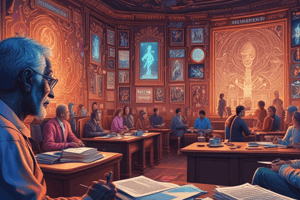Podcast
Questions and Answers
What is the primary aim of critical thinking as described?
What is the primary aim of critical thinking as described?
- To analyze, evaluate, and improve thinking (correct)
- To ensure perfect decision-making every time
- To foster a self-serving perspective
- To avoid all forms of bias in thinking
Which of the following best describes egocentric thinking?
Which of the following best describes egocentric thinking?
- Thinking that prioritizes group interests over individual ones
- An analytical approach to understanding group dynamics
- A self-serving perspective that disregards others' needs (correct)
- A broad view considering multiple viewpoints
What kind of thinking is considered an extension of egocentric thinking?
What kind of thinking is considered an extension of egocentric thinking?
- Analytical thinking
- Intuitive thinking
- Critical thinking
- Sociocentric thinking (correct)
What often causes individuals to remain in their comfort zones, according to the content?
What often causes individuals to remain in their comfort zones, according to the content?
What is the first phase of critical thinking?
What is the first phase of critical thinking?
What does the content suggest is a consequence of leaving thinking unchecked?
What does the content suggest is a consequence of leaving thinking unchecked?
What is a potential outcome of sociocentric thinking?
What is a potential outcome of sociocentric thinking?
How does critical thinking relate to improving thought quality?
How does critical thinking relate to improving thought quality?
What does intellectual empathy require an individual to do regularly?
What does intellectual empathy require an individual to do regularly?
Which concept emphasizes holding oneself to the same standards expected of others?
Which concept emphasizes holding oneself to the same standards expected of others?
What is the opposite of confidence in reason as described in the content?
What is the opposite of confidence in reason as described in the content?
What exemplifies the opposite of intellectual integrity?
What exemplifies the opposite of intellectual integrity?
What is an improper use of thinking characterized by a lack of consideration for evidence and reasoning?
What is an improper use of thinking characterized by a lack of consideration for evidence and reasoning?
What is the primary requirement for fair-mindedness in critical thinking?
What is the primary requirement for fair-mindedness in critical thinking?
What trait of mind does intellectual courage most directly oppose?
What trait of mind does intellectual courage most directly oppose?
Which trait involves valuing independence of thought and adhering to rational standards?
Which trait involves valuing independence of thought and adhering to rational standards?
How is weak-sense critical thinking characterized?
How is weak-sense critical thinking characterized?
What does intellectual perseverance imply about a thinker’s approach to challenges?
What does intellectual perseverance imply about a thinker’s approach to challenges?
Which of the following is a core component that supports fair-minded critical thinking?
Which of the following is a core component that supports fair-minded critical thinking?
Which term is used to describe the art of winning arguments without regard for the truth?
Which term is used to describe the art of winning arguments without regard for the truth?
What is the opposite of intellectual humility?
What is the opposite of intellectual humility?
Which intellectual standard focuses on how well a statement is related to the issue at hand?
Which intellectual standard focuses on how well a statement is related to the issue at hand?
What question would best prompt a need for precision in thinking?
What question would best prompt a need for precision in thinking?
Which question aligns with evaluating the depth of a given problem?
Which question aligns with evaluating the depth of a given problem?
When considering fairness in a discussion, which question is appropriate?
When considering fairness in a discussion, which question is appropriate?
Which of the following standards would focus on the accuracy of the facts presented?
Which of the following standards would focus on the accuracy of the facts presented?
Which question best addresses the need for breadth in evaluating an argument?
Which question best addresses the need for breadth in evaluating an argument?
Which standard would involve assessing the significance of a problem?
Which standard would involve assessing the significance of a problem?
The question 'Does all this make sense together?' best pertains to which intellectual standard?
The question 'Does all this make sense together?' best pertains to which intellectual standard?
Flashcards are hidden until you start studying
Study Notes
Critical Thinking
- Critical thinking is the process of analyzing, evaluating, and improving your thinking.
- Everyone thinks, but much of our thinking can be biased, distorted, partial, uninformed, or prejudiced.
- The quality of our life and work is directly affected by the quality of our thinking.
- Shoddy thinking can lead to costly mistakes, both in terms of money and quality of life.
Obstacles to Critical Thinking
- Egocentric Thinking: This is the tendency to see the world from a narrow, self-serving perspective.
- We may not naturally consider the rights, needs, and viewpoints of others.
- We prioritize our own needs and wants, even at the expense of others.
- We may fail to see alternative options and perspectives, leading to self-serving actions.
- Sociocentric Thinking: This is an expanded form of egocentric thinking.
- It is the tendency to view the world in relation to the interests of our group.
- We may favor our group's perspective over others, even if it is not fair or reasonable.
Sources of Bias in Thinking
- Familiarity and Customary Beliefs: We tend to rely on what we know and what is familiar to us.
- Comfort Zones: We stick to our comfort zones, even when they limit our thinking.
- Past Successes: We may be enslaved by past successes, making it difficult to challenge our old ways of thinking.
- Social Groups: We may be influenced by the beliefs and values of our social groups.
- Education Received: Our education can shape our thinking and biases.
Intellectual Standards
- Clarity - Understandable, the meaning can be grasped.
- Accuracy - Free from errors or distortions, true.
- Precision - Exact to the necessary level of detail.
- Relevance - Relating to the matter at hand.
- Depth - Containing complexities and multiple interrelationships.
- Breadth - Encompassing multiple viewpoints.
- Logic - The parts make sense together, no contradictions.
- Significance - Focusing on the important, not trivial.
- Fairness - Justifiable, not self-serving or one-sided.
Fair-minded Thinking
- Critical Thinking can be used for self-centeredness or fairmindedness.
- Weak-sense critical thinkers are missing important higher-level skills of critical thinking and fail to consider viewpoints contradicting their own.
- Strong-sense critical thinkers use their thinking in an ethical, reasonable manner. This type of thinking encompasses the following traits:
- Intellectual Humility - Striving to discover the extent of your ignorance.
- Intellectual Autonomy - Thinking for oneself while adhering to standards of rationality.
- Intellectual Courage - Challenging popular beliefs, prejudices, and ignorance.
- Intellectual Perseverance - Refusing to give up easily, working through complexities and frustration.
- Intellectual Empathy - Learning to enter opposing views empathically.
- Intellectual Integrity - Holding oneself to the same standards one holds others.
- Confidence in Reason - Respecting evidence and reasoning, valuing them as tools for truth.
Studying That Suits You
Use AI to generate personalized quizzes and flashcards to suit your learning preferences.




